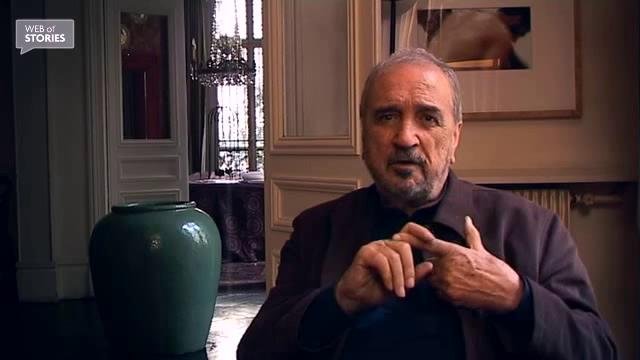NEXT STORY

'It Was War'
RELATED STORIES

NEXT STORY

'It Was War'
RELATED STORIES


|
Views | Duration | |
|---|---|---|---|
| 11. Each country writes history its own way | 2 | 127 | 02:31 |
| 12. Military experience in Algeria | 118 | 01:40 | |
| 13. Algeria’s past | 98 | 01:52 | |
| 14. 'It Was War' | 96 | 01:33 | |
| 15. Working as the colonel’s secretary | 86 | 01:14 | |
| 16. My life inclined towards films | 114 | 03:33 | |
| 17. Jacques Tati picked me | 1 | 175 | 03:39 |
| 18. Observations in the rain | 1 | 150 | 01:06 |
| 19. What I learned from Tati | 2 | 167 | 01:24 |
| 20. Quest for the ideal sound effect | 135 | 02:05 |


The history of Algeria is enthralling as it is a continuation of occupations which eventually found a people, gave shape, gave birth to an independent people. You could find in Algeria... next to the barrack room were Romans headstones, a Roman cemetery, with really pretty sculptures; some soldiers coming back from their patrol were pissing on them. There were lots of Turkish archaeological remains. There was an infinite amount of relics of the past from the Arab invasions, as Algeria was invaded by the Arabs much like the rest of the Maghreb, and so on. So you find all the layers of history, you could find Algeria, and that was fascinating. For instance, I remember one day working with French engineers who wanted to bring water over from a river in a village across the entire terrain. They started with complicated calculus and so on, then they traced the optimal route, and as they started digging, they were following exactly the Roman waterways from 20 centuries before. It was obviously fascinating for a historian to see how history rediscovers itself. Later, I wrote a book about my recollections, La paix des braves, which was later adapted as a TV film, working with Algerians. It was maybe the first, or even the only time, two countries that had been at war were making a film together about their war.
L’histoire d’Algérie elle est très passionnante parce que c’est une série d’occupation qui finalement trouve un peuple, forme… donne naissance à un peuple indépendant. On trouvait en Algérie… à coté de la caserne il y avait des stèles funéraires romaines, d’un cimentière romain, avec des très jolies sculptures d’ailleurs, sur lesquelles, les soldats, le soir en rentrant d’opérations allaient pisser au passage comme ca. Il y avait évidement des vestiges turcs, de l’occupation turque. Il y avait des quantités de restes du passé de l’invasion arabe parce que Algérie était envahi par les Arabes comme tout le Maghreb, et ainsi de suite… c’est donc que toutes les couches de l’occupation historique d’un sol, on pouvait y trouver l’Algérie et ça me passionnait. Par exemple, je me rappelle un jour être allé avec des ingénieurs français qui voulaient faire un travail pour amener l’eau, d’un endroit où il y avait de l’eau… un ruisseau dans un village… en traversant tout le paysage. Ils ont commencé avec des calculs très savants etc, puis ils ont tracé le parcours idéal pour... et en creusant ils sont tombés directement sur la canalisation romaine, qui était là depuis 20 siècles. C’était évidemment frappant et intéressant du point de vue de l’historien bien sur de voir comment l’histoire se retrouve elle-même. Par la suite, j ai écrit un livre sur la guerre d’Algérie sur mes souvenirs, La paix des braves et de ce livre, longtemps après, 20 ans après, nous avons fait un film de télévision qui s’appelle C’était la guerre avec des algériens, c’est peut-être la première, peut-être la seule fois, que deux pays qui ont été en guerre font un film ensemble sur leur guerre.
French screenwriter Jean-Claude Carrière (1931-2021) began his association with films aged 24 when he was selected by Jacques Tati to write for him. This early experience led to further contact with other film-makers, including Luis Buñuel with whom Carrière collaborated for many years. He wrote screenplays for films including Belle de Jour, The Discreet Charms of the Bourgeoisie, Tin Drum and Danton.
Title: Algeria’s past
Listeners: Andrzej Wolski
Film director and documentary maker, Andrzej Wolski has made around 40 films since 1982 for French television, the BBC, TVP and other TV networks. He specializes in portraits and in historical films. Films that he has directed or written the screenplay for include Kultura, which he co-directed with Agnieszka Holland, and KOR which presents the history of the Worker’s Defence Committee as told by its members. Andrzej Wolski has received many awards for his work, including the UNESCO Grand Prix at the Festival du Film d’Art.
Tags: Algeria, Maghreb, La paix des braves
Duration: 1 minute, 52 seconds
Date story recorded: January 2010
Date story went live: 26 July 2010